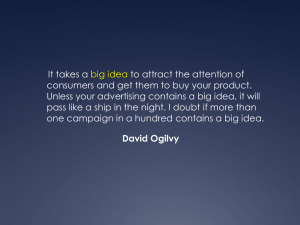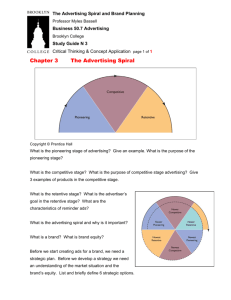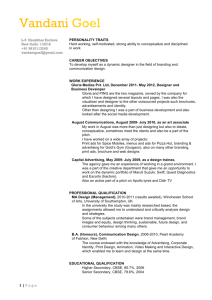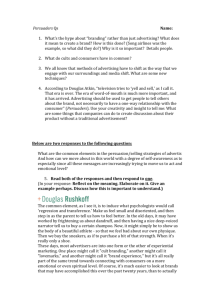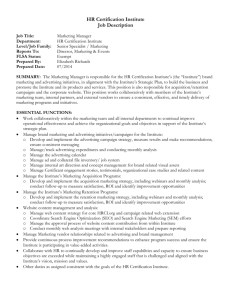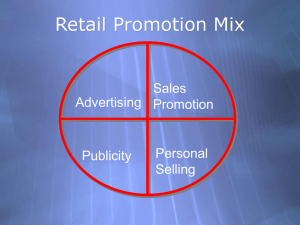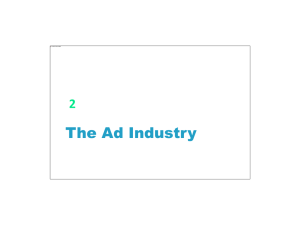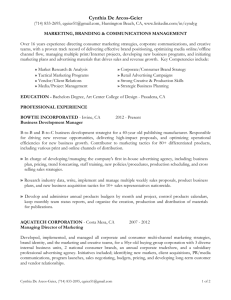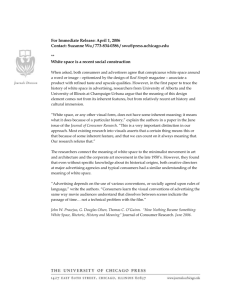Advertising's Role in Marketing Chapter Outline Key Points
advertisement
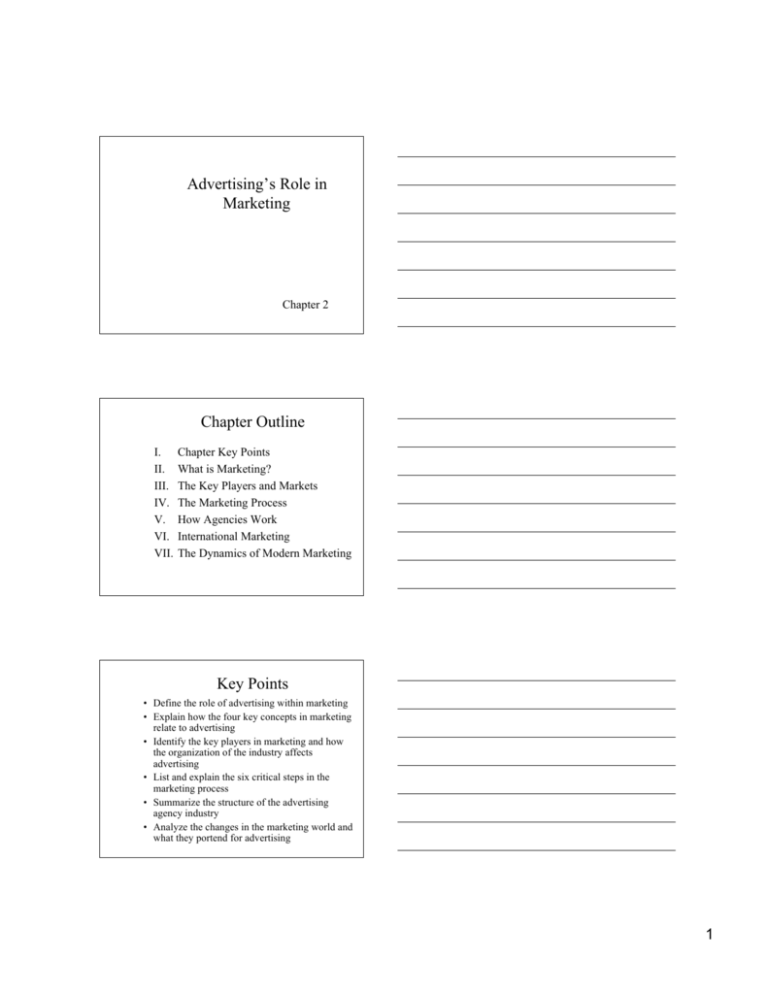
Advertising’s Role in Marketing Chapter 2 Chapter Outline I. II. III. IV. V. VI. VII. Chapter Key Points What is Marketing? The Key Players and Markets The Marketing Process How Agencies Work International Marketing The Dynamics of Modern Marketing Key Points • Define the role of advertising within marketing • Explain how the four key concepts in marketing relate to advertising • Identify the key players in marketing and how the organization of the industry affects advertising • List and explain the six critical steps in the marketing process • Summarize the structure of the advertising agency industry • Analyze the changes in the marketing world and what they portend for advertising 1 The Marketing Concept • Marketing should focus first on identifying the needs and wants of the customer • Marketers must focus on the customers’ problems and develop products to solve them Video Snippet Dunkin’ Donuts discusses its focus on the consumer Ivory Soap Ivory represents one of the all-time great marketing stories Visit the Site Exchange • The act of trading a desired product or service to receive something of value in return Mo ney M on ey Goo ds Goods 2 Branding • Brand equity is reputation, meaning and value that the brand name or symbol has acquired over time Added Value • A marketing or advertising activity makes a product more valuable, useful or appealing A Motorcycle is a Motorcycle… But a Harley is Something Different Visit the Site 3 Key Players: The Marketer • The organization, company or manufacturer producing the product and offering it for sale • The advertiser or client (from the agency’s point of view) Key Players: Suppliers and Vendors • Other companies that manufacture the materials and ingredients used in producing the product Key Players: Distributors and Retailers • Various companies that are involved in moving a product from its manufacturer to the buyer 4 Types of Markets Figure 2.1 Consumer Markets • People who buy products and services for personal or household use Business-to-Business Markets • Companies that but products or services to use in their own businesses 5 Institutional Markets • Profit and non-profit organizations that provide goods and services for the benefit of society Channel Markets • Members of the distribution chain who buy finished or semifinished products and resell them for a profit The Marketing Process 1. 2. 3. 4. 5. 6. Conduct research and develop situation analysis Set objectives Assess consumer needs and wants Differentiate and position Develop marketing mix Evaluate the effectiveness 6 Marketing Mix Strategies Figure 2.2 Krispy Kreme: Marketing a Passion for Doughnuts Visit the Site Push, Pull, and Combination Strategies Figure 2.3 7 Specialized Agencies Specialize in certain functions, audiences, industries, or markets Visit the Site Full Service Agencies Account Management Human Resources Production Creative Services Full Service Agency Media Planning and Buying Account Planning Traffic Accounting How Agencies Work • • • • • Account management Creative development and production Media planning and buying Account planning and research Internal agency services 8 Dentsu: The Top Agency Brand in the World Visit the Site How Agencies Make Money • Agencies derive revenue from two major sources – Commission – Fees Figure 2.4 International Marketing • An international brand is available virtually anywhere in the world 9 The Most Recognizable Brand in the World Visit the Site The Dynamics of Modern Marketing • Integrated marketing • Relationship marketing • Permission marketing Discussion Questions 10 Discussion Question 1 • Find an example of an advertisement that you think demonstrates the marketing concept and another ad that you think does not represent an effective application of the marketing concept. • Compare the two and explain why you evaluated them as you did. Discussion Question 2 • Professor Baker tells her advertising class that advertising’s relationship to marketing is like the tip of an iceberg. • As the class looks puzzled, she explains that most (80 percent) of the iceberg cannot be seen. “It’s the same with the consumer’s perception of how much of marketing is advertising-related.” • What is Baker trying to illustrate with the iceberg analogy? Discussion Question 3 • This chapter stressed integration of advertising with other components of the marketing mix. If you were in marketing management for Kellogg cereals, – How would you see advertising supporting product, price, and place? – Could advertising improve each of these functions for Kellogg? • Explain your answer. 11 Discussion Question 4 • As this chapter states, Coca-Cola is the most recognizable brand in the world – How did the company achieve this? – What has the company done in its marketing mix in terms of product, price, distribution, and marketing communications that has created such tremendous brand equity and loyalty? – How has advertising aided in building the brand? • You might want to visit Coca-Cola’s Web site for help: www.coca-cola.com Discussion Question 5 • Imagine you are starting a company to manufacture fudge. Consider the following decisions: – Describe the marketing mix you think would be most effective for this company. – Describe the marketing communication mix you would recommend for this company. – How would you determine the advertising budget for your new fudge company? – What brand image would you recommend for your fudge? 12
